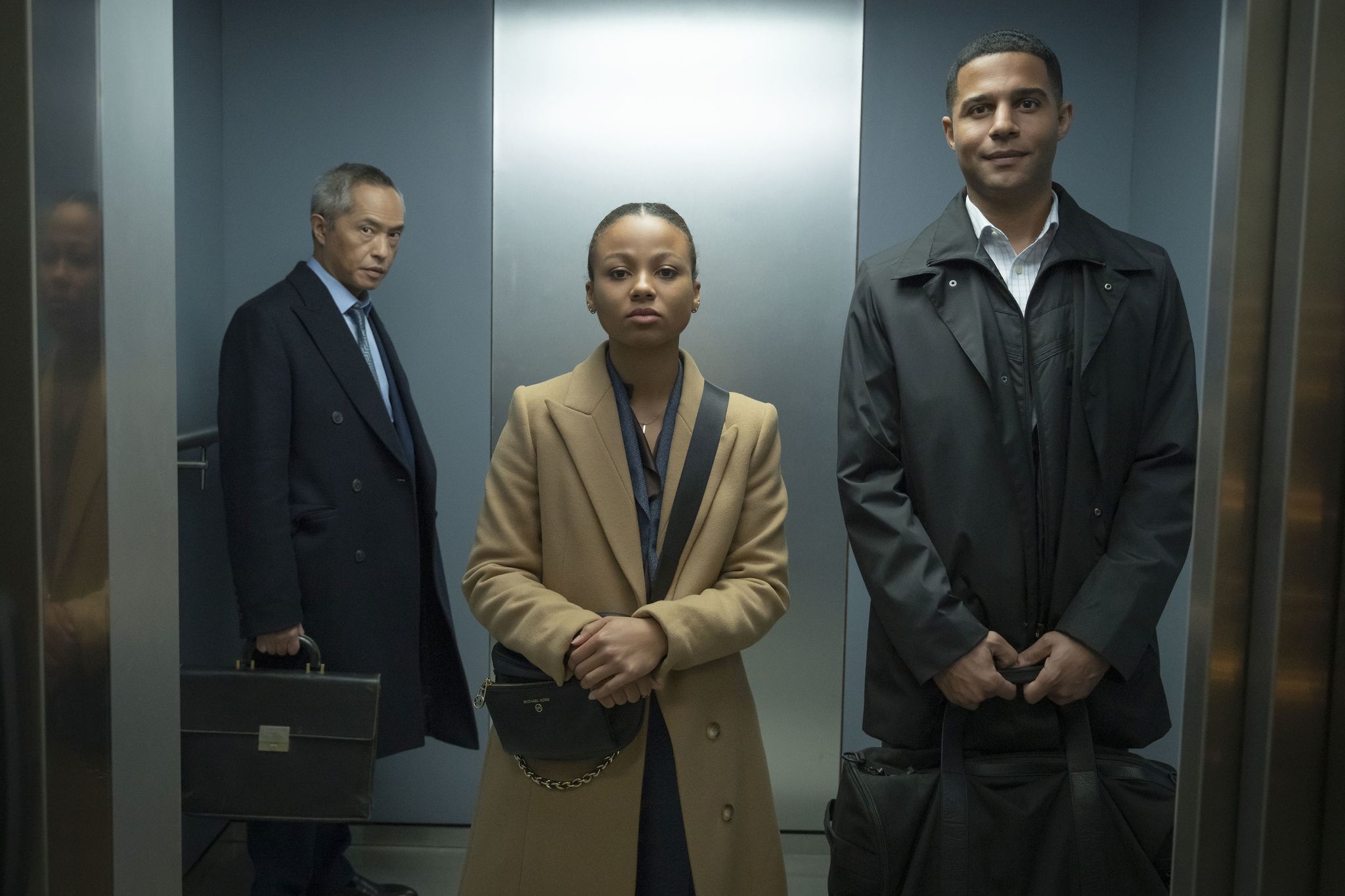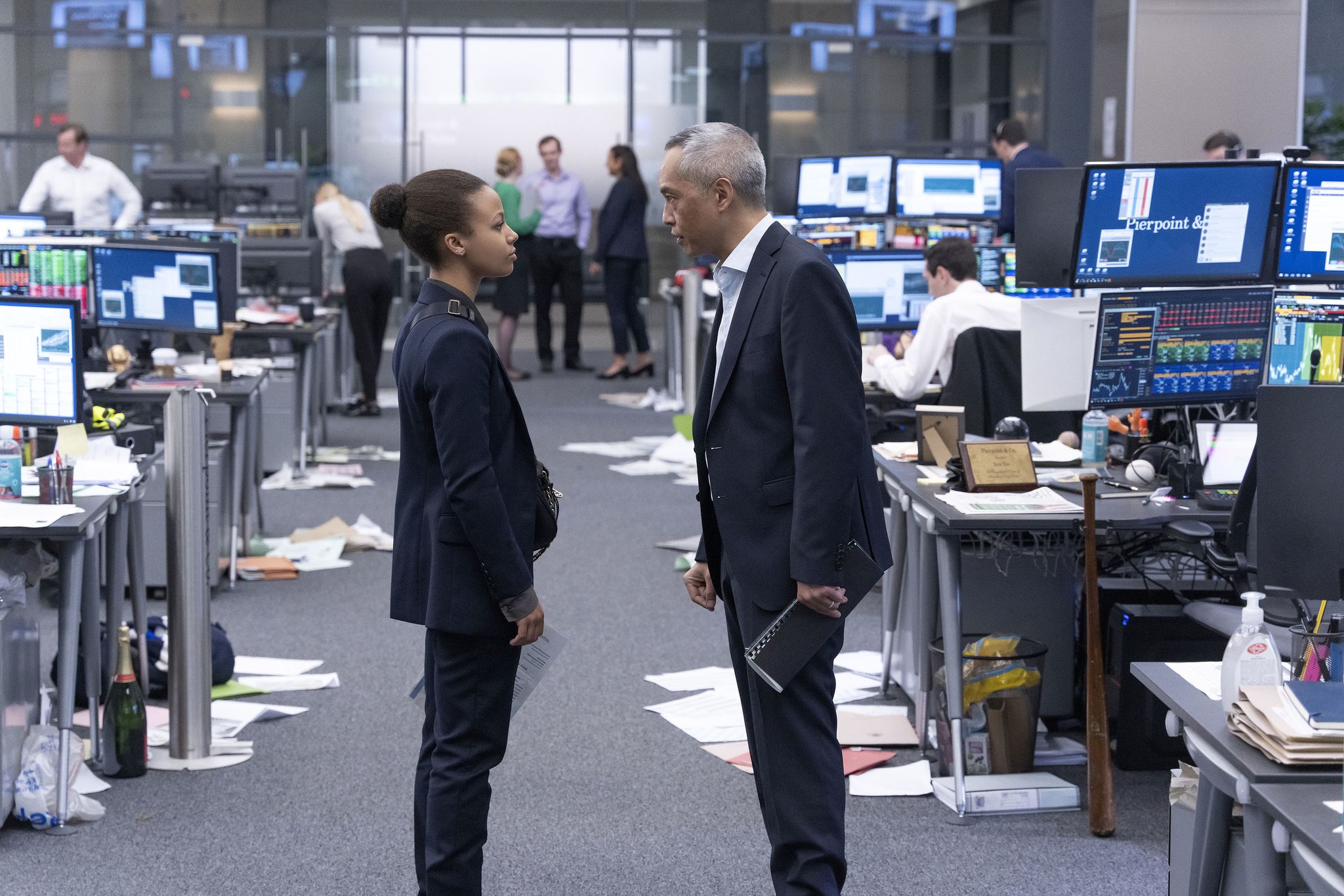Whether you found Industry in the depths of the pandemic like the OG followers of the BBC/HBO investment bank-based workplace drama, or caught on sometime after, there’s one experience shared by all: confusion over the show's flummoxing finance jargon. Unless, of course, you work in finance. Which is exactly where the show’s creators come from.
Mickey Down and Konrad Kay are ex-fledgling finance bros. The two Londoners got in and out of high stakes transactional dealings young, and subsequently wrote a TV show about it.
“There’s a lot to be said for the simplicity of a bit,” Kay tells us. “We were so obsessed with detail and reality in season one, I think what we’ve learned over the course of two seasons is that we can still tell interesting, complex, workplace stories without convoluting them too much. Sometimes, the simpler the business story, the better the episode.”
Industry is set in the world of international banking and stars Myha’la Herrold, Marisa Abela, Harry Lawtey, David Jonsson, and Ken Leung, among others, and in its second season we get to go deeper into the characters’ backstories. The cast is also joined by Jay Duplass – an American billionaire with a talent for making money off Covid-19 who catches the keen eye of ambitious Harper Stern (Herrold) – and Alex Alomar Akpobome – a New York colleague looking to trim the London office’s fat in a possible restructuring.
The series is now available in full on BBC iPlayer, and is released weekly on BBC One. To help you out, Esquire quizzed Down and Kay on all the terms, phrases, acronyms you need to know (beware, slight spoilers below).
BID AWAY
“This is quite a weird way of saying, ‘garnering attraction’ from a rival to the point where they might pay for your services to leave the bank and go somewhere else,” says Kay. “At the end of episode six, [someone] says, ‘Do you think we’re a bid away?’ which means, ‘Do you think we, as a team, are worth enough for you to pay for our services to leave.’ But to a layman, is that even English?”
MD and ED
Managing director and executive director are not unique titles, as there can be more than one MD or ED on a team. In an American bank, at the bottom would be an analyst, then associate, then vice president, then executive director, and then managing director. “After that, you’d usually become a partner,” Down says. Of course, there are positions higher than that, like Bill Adler (Trevor White) who is global head of FICC [see below]. Eric (Leung) is an MD; Danny aka DVD (Akpobome) is an ED, so is junior to Eric, but ambitious EDs sometimes run desks if there isn’t an MD to do so. It’s a good way of showing that you have what it takes to become an MD.
FICC
Fixed Income Currencies and Commodities is the group within an investment bank that handles fixed income instruments (bonds), currencies, and commodities. Both the CPS (cross product sales i.e they sell everything) team and FX (foreign exchange/currencies) team would fall under FICC.
SHORTING/SHORT SELLING
Down doesn’t think we actually need to know the technical mechanics of short selling to understand it, but feels it deserves a spot on the list just the same. Basically, “if you short something, you want it to go down rather than go up,” says Down.
CRMS
Client Relationship Management Services. “It’s so funny because CRMS actually exists,” says Kay, “and when I say it out loud, it sounds so dystopian, like something you’d make up.” CRMS is a type of ambassadorial role where they take someone off the trading floor and give them the responsibility of looking after holistic strategy for the bank. “Harper talks about looking at client relationships from a 35,000-foot view,” says Kay. “It’s seen as a place where you can put older salespeople out to pasture because you can basically promote them into an ambassadorial role and pay them less money because they’re not client-facing anymore.”
DVO1
“That’s prime financial gibberish from season one,” Kay laughs. “I think it’s a technical term about the price of an option over time, but I have literally no idea what it means beyond that.”
“That’s a specific bit of jargon that is actually meant to be unintelligible because it’s the first bit of jargon you hear in the show, and it’s the first bit that Harper hears,” adds Down. “It’s meant to sort of throw you, and make you think, ‘Okay, I’m seeing the world through Harper’s eyes and I’m understanding this as little as she is.’ The problem then is that we have unintelligible finance dialogue which we expect the audience to understand.” Down promises that they stayed away from anything quite so complex in season two.
MEME STOCKS
“Literally just this year and the end of last year, retail investors – i.e., individuals usually using an app like Robin Hood to buy and sell stocks rather than going through a broker – have made meme stocks a recent phenomenon,” says Down. To make a long story short, the phrase came about when retail investors on Reddit, specifically ‘Wall Street Bets,’ a sub-Reddit, decided to buy the stocks of languishing companies that they associated with nostalgia – GameStop and Blackberry were among many companies that had been massively shorted by big hedge funds and were being destroyed not as a result of that, but because they didn’t have any fundamental value anymore. “So, it became this sort of David and Goliath thing of going after big hedge funds that had big short positions in these household name products, and was a way of making money.”
LAYUP TRADE
“Layup trade is a sports metaphor for the easiest trade,” says Kay. “In basketball, a layup is the simplest way of scoring a basket, so people can make the quickest and easiest money with a layup trade.”
FLOW and COLOUR
Both Down and Kay admit that flow and colour is pretty vague. It really just means how the market has been moving, i.e., who’s been buying and selling what from a client point of view. “’Colour’ is a catchall for ‘information,’” says Kay.
RISK ASSET
A risk asset is anything other than steady income instruments, like bonds. It’s anything where you stand a bigger chance of losing money: stocks, commodities, currencies.
*Spoiler below*
RICAN HEALTHCARE
“We have a consultant on the show who wishes to remain anonymous but has their ears to ground with this kind of stuff,” offers Down. “They’re quite high up in the industry and they have this preternatural talent for almost predicting what is going to happen in the markets. Amazon’s purchase of FastAide [in the world of Industry] has some parallels with Amazon’s purchase of One Medical, which is happening now. Although One Medical is more analogous with Rican, a telehealth company which Rishi (Sagar Radia) describes as ‘rich people being able to use doctors from the comfort of their Chelsea Mews house.’ It’s both a prescriptive GP service and has a mental health angle as well, which Gus (Jonsson) discusses at one point.
"So, these telehealth/medicine businesses did quite well during the pandemic because everyone was working remotely and the wider story for conception was that Amazon, in order to get a foot in the telehealth business, wanted to buy up the locations of FastAide stores – similar to Boots or Superdrug – and put their technology in them. They wanted a physical location for their technology rollout, whereas Rican was a fully remote surface. And they’re in opposition because FastAide is a brick-and-mortar company which is going to go down to zero because it’s not doing very well, because no one goes to high street anymore. But Amazon considered that as an opportunity to buy it cheap and turn it into these outposts of their own telehealth business. And that is in opposition to Rican because they want the NHS contracts, and the government is still trying to figure out which private company to give those contracts to. Do they partner up with Rican and make it all remote, or are they going to partner up with Amazon and make them a physical location? I mean, now that I say that all out loud, I realise that it sounds insanely complicated.” [Laughs.]















